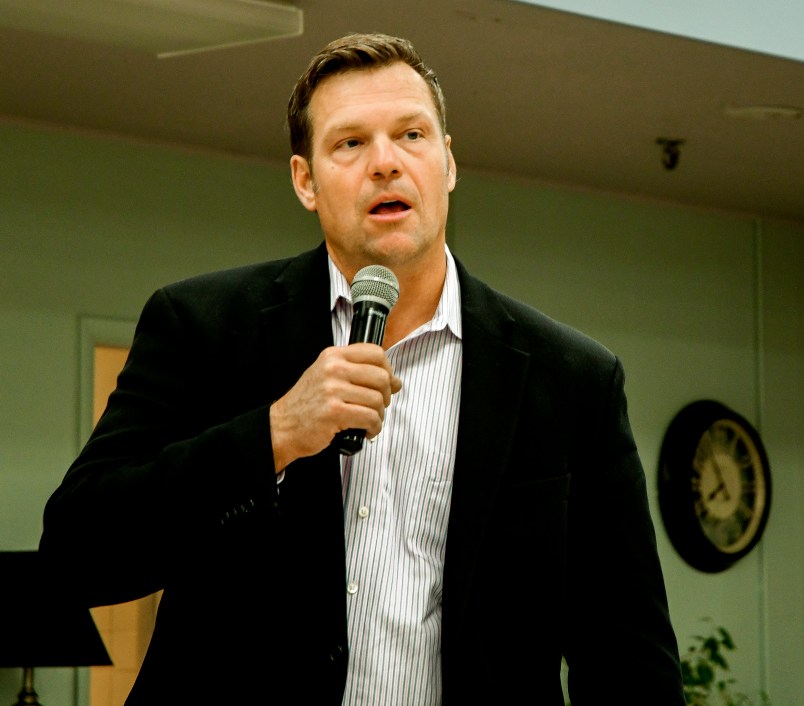This week, the Kansans challenging their state’s voter registration proof-of-citizenship law got their day in court to explain why the requirement impeded the right to vote.
One witness said the $27 it would have cost her to replace her birth certificate was tough for her tight budget. Another had to search the home of his recently deceased mother in another state for his birth certificate — a search that was unsuccessful. Another witness detailed a voter registration drive that focused on people who had tried to register but hadn’t submitted proof-of-citizen documents. The activists leading the drive brought a portable copying machine door to door, and even still, only a fraction of the targeted registrations were completed.
In response, lawyers representing Kansas Secretary of State Kris Kobach tried to argue that those obstacles weren’t really burdens. And they suggested that these would-be voters just hadn’t tried hard enough.
The case, Fish v. Kobach, is being brought by the ACLU on behalf of a group of citizens who say they were unable to vote because of the requirement, which was implemented in 2013. Another case, Bednasek, was merged with it for the trial.
Steven Wayne Fish, 37, the lead plaintiff and a Lawrence, Kansas resident, testified that he sought to register to vote while renewing his driver’s license in 2014. When he realized he needed to a document proving his citizenship, he searched high and low for his birth certificate. Because Fish was born on a now-closed military base in Illinois, he had no idea where it was located or where the hospital record of his birth would even be stored.
Fish even searched the house of his mother, who had recently died, but with no luck.
Another plaintiff, Charles “Tad” Stricker, testified that he had just started working a 60-plus hours-a-week job as a hotel manager when he tried to register to vote. He had taken a day off to obtain a Kansas driver’s license, having recently moved back to the state, and knew it was the deadline to register to vote for the next election. Stricker realized when he got to the DMV that he was missing a document required for his driver’s license, and ran home to grab all of his documents just in case, including his birth certificate. After successfully renewing his license, Stricker left the DMV with the understanding that he had been registered, particularly because he asked when he would receive his voter information. He was not aware he wasn’t registered until he showed up to vote that November.
Donna Bucci, a cafeteria worker in a Kansas prison, testified that she didn’t know where her birth certificate was and that the $27 it would cost to replace it — she was born in Baltimore — was not an easy expense for her.
In their cross-examination of the challengers, Kobach and his legal team attempted to suggest that Fish, Stricker and Bucci could have successfully registered if they’d just put in the effort.
One of Kobach’s lawyers brought up a deposition they had previously taken of Fish. The lawyer suggested Kobach’s office could have helped him register to vote then, as his birth certificate was found by his sister shortly before the deposition. (Fish was worried that registering at that point would make him ineligible to stay in the case.)
Sue Becker, another Kobach attorney, asked Bucci why she hadn’t sought to participate in a teleconference the elections board offers for those who don’t have the right documents. Bucci said she can’t bring her phone into the prison where she works, so she would have had to run out into the parking lot to do the call from her car. Bucci said she wouldn’t have known who to call, or how long it would have taken anyway.
Stricker was quizzed on why he didn’t just use his lunch break to drive to the local elections office to submit his proof of citizenship. He said that he ate lunch at his desk, and being new at his job, he was uncomfortable leaving for more than five or ten minutes, as he had when he occasionally went out to buy lunch.
Becker even pressed Marge Ahrens — the League of Women Voters-Kansas co-president who had testified how the law taxed her group’s voter registration drivers — on whether it was “easy” for a local league to bring a portable copy machine around to make copies of people’s birth certificates.
The local group had visited the homes of 115 people who had started registrations but hadn’t submitted the proof of citizenship. Sixteen registrations were completed during the drive, five of them using the copying machine. A total of 30 of the 115 individuals ultimately completed their registrations, Ahrens testified.
Becker brought up a comment one of the people who was registered made about the portable copying machine making the process “easy.”
Ahrens, in explaining the comment, noted the work that went into running the drive.
“In context, it’s hilarious,” Ahrens said.







I am going to go out on a limb here and call Kobach a slimy, disgusting prick.
You flatter him unnecessarily.
There should never have to be any “try” about it. That’s long been the law and policy in this country from the get-go.
Say, that gives me an idea. Maybe the Republicans could win more elections even without suppressing voting if they tried harder to enact policies that benefited regular people.